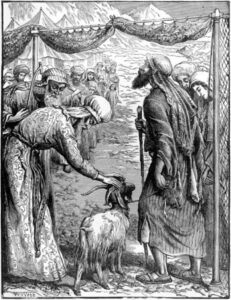“Scapegoat” has taken on a new meaning.

Is it separation from sin or separation from a person whose views we don’t like?
Watch our Truth in Two to find out how and why (full text plus stories links bel0w). #9 in our summer series on the cultural appropriation of Hebraic-Christian language.

Subscribe to MarkEckel.com (here). Find the MarkEckel.com YouTube Channel (here). Mark is President of The Comenius Institute (website). Dr. Eckel spends time with Christian young people in public university (1 minute video), teaching at Indiana University Purdue University at Indianapolis, and interprets culture from a Christian vantage point (1 minute video). Consider becoming a Comenius patron (here).
Picture Credit: Luke Renoe, Snappy Goat
FULL TEXT
Imagine being a scapegoat. In Leviticus 16, a “scapegoat” was an animal upon whom the sins of the people were figuratively placed. The goat was then sent into the wilderness, carrying the nation’s sins with it. Removing sin from the Israelite camp was not simply an object lesson but a ceremony of belief. Sin is what separates God from His people; so, God wanted His people to separate themselves from sin. The scapegoat was a physical demonstration of belief.
Current cultural belief is much different. A “scapegoat” is one who gets blamed for something they did not do by a person who is responsible for the wrongdoing. Scapegoating can take different forms. A person who has little authority in an organization can be “thrown under the bus” as the popular metaphor is used today. Another person, again with little say in the matter, may be asked “to fall on their sword,” another way that the innocent person may take the blame they don’t deserve.
In some cases, a person resigns her position seeing no alternative to the hostile work environment she is in. Bari Weiss, a case in point, was so verbally accosted by her subordinates, that she resigned. The New York Times did not acknowledge the caustic work environment but accepted Weiss’ resignation without any recriminations against those who wronged her. In Weiss’ case she bore the sin of the newspaper without an acknowledgement of wrongdoing by those who wronged her. But Bari Weiss had done nothing wrong: she simply transgressed the accepted cultural standard of the day: she was not woke enough.
Our culture outs, cancels, ignores, suspends, or scapegoats people who go against what is accepted as cultural narrative. The biblical viewpoint is different. The scapegoat is not a sign that reads, “Let this be a lesson to the rest of you!” No. A Hebraic-Christian view of the scapegoat is that we have transgressed God’s laws, not what the culture declares is righteous. For Truth in Two, this is Dr. Mark Eckel, president of the Comenius Institute, personally acknowledging his need of the most famous scapegoat: Jesus.
References to Bari Weiss of many comments from news media – this one from Politico – after Bari Weiss resigned from the New York Times last summer.
Read Weiss’s resignation letter here.

